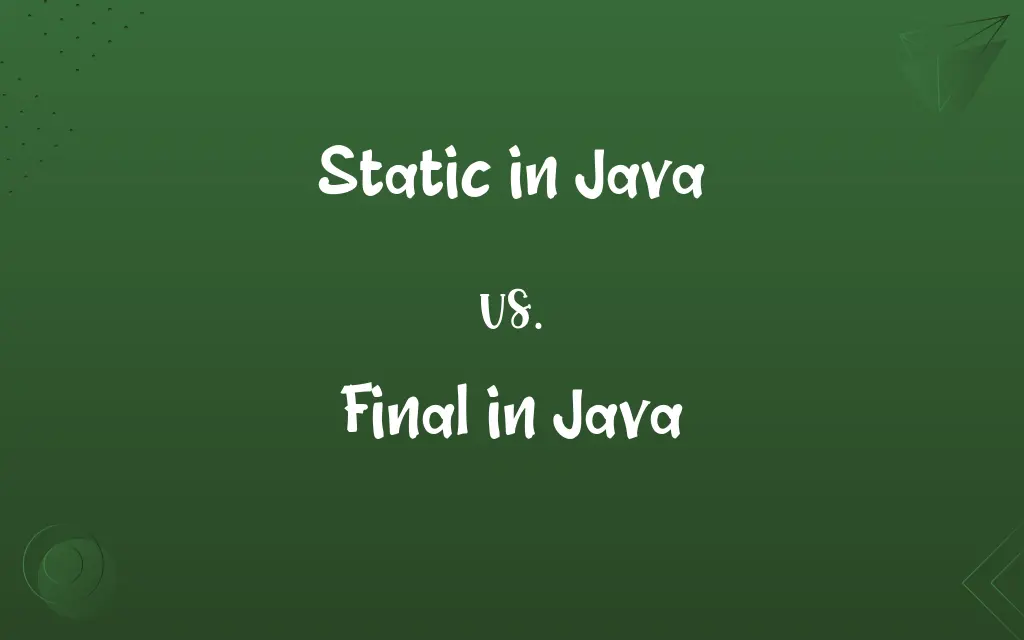Static in Java vs. Final in Java: Know the Difference

By Shumaila Saeed || Published on February 3, 2024
In Java, 'static' refers to a class-level member shared by all instances, while 'final' denotes a constant or an unchangeable reference.

Key Differences
In Java, 'static' is a keyword used to indicate that a variable or method belongs to the class itself, rather than to any specific instance. On the other hand, 'final' is used to declare constants or to prevent method overriding or inheritance of classes.
Shumaila Saeed
Feb 03, 2024
Static members are initialized only once, at the start of the execution and shared by all instances of the class, conserving memory. Conversely, final variables, once assigned a value, cannot be reinitialized; final methods cannot be overridden; and final classes cannot be subclassed.
Shumaila Saeed
Feb 03, 2024
Static methods can be called without creating an instance of the class, primarily used for utility or helper methods. Final keywords, when applied to methods, ensure they keep their implementation in the entire hierarchy, protecting the method's behavior.
Shumaila Saeed
Feb 03, 2024
Static variables can maintain a common state shared across all instances of the class. In contrast, final variables are often used to create immutable objects or constant values that should not change once initialized.
Shumaila Saeed
Feb 03, 2024
In Java, static blocks can be used for static initializations, executed when the class is loaded. Final, however, has no such concept but ensures that once a final variable is assigned or a final method is defined, it remains constant or unchanged.
Shumaila Saeed
Feb 03, 2024
ADVERTISEMENT
Comparison Chart
Scope
Belongs to the class, not instances
Implies immutability or prevention of change
Shumaila Saeed
Feb 03, 2024
Usage
For shared class variables/methods
For constants, immutable objects, finalizing methods or classes
Shumaila Saeed
Feb 03, 2024
Initialization
Initialized once, at class loading
Assigned once, cannot be reinitialized
Shumaila Saeed
Feb 03, 2024
Class Implication
No direct implication on class inheritance
Prevents the class from being subclassed
Shumaila Saeed
Feb 03, 2024
ADVERTISEMENT
Static in Java and Final in Java Definitions
Static in Java
Static methods can be called without an object instance.
Use Math.PI to access the static constant PI in the Math class.
Shumaila Saeed
Jan 24, 2024
Final in Java
Final variables can be assigned only once.
Once assigned, the final variable MIN_BALANCE cannot be reassigned.
Shumaila Saeed
Jan 24, 2024
Static in Java
Static members are part of the class, not individual objects.
The static method calculateInterest is called without creating an object.
Shumaila Saeed
Jan 24, 2024
Final in Java
Final in Java is used to create constants.
The final variable MAX_SIZE is set to 100 and cannot be changed.
Shumaila Saeed
Jan 24, 2024
Static in Java
Static in Java means a member belongs to the class rather than instances.
The static variable employeeCount tracks the number of employees.
Shumaila Saeed
Jan 24, 2024
ADVERTISEMENT
Final in Java
Final methods cannot be overridden by subclasses.
The final method displayDetails() cannot be overridden in any subclass.
Shumaila Saeed
Jan 24, 2024
Static in Java
Static blocks are used for static initialization in a class.
The static block initializes shared resources when the class is loaded.
Shumaila Saeed
Jan 24, 2024
Final in Java
Final ensures immutability of the reference.
The final List reference myList cannot be pointed to another list.
Shumaila Saeed
Jan 24, 2024
Static in Java
Static variables are shared by all instances of the class.
All instances of the class share the same static configuration settings.
Shumaila Saeed
Jan 24, 2024
Final in Java
Final classes cannot be extended.
The final class ImmutablePoint cannot be subclassed.
Shumaila Saeed
Jan 24, 2024
Repeatedly Asked Queries
Can final variables be static?
Yes, final variables can be static, making them class constants that cannot be changed.
Shumaila Saeed
Feb 03, 2024
What does final mean in Java?
Final in Java designates immutability, indicating that a variable cannot be re-assigned, a method cannot be overridden, or a class cannot be subclassed.
Shumaila Saeed
Feb 03, 2024
What does static mean in Java?
Static in Java indicates that a member (variable, method, block) belongs to the class itself rather than to a specific instance.
Shumaila Saeed
Feb 03, 2024
Can static methods use instance variables?
No, static methods cannot directly access instance variables as they belong to the class, not an instance.
Shumaila Saeed
Feb 03, 2024
Do static members get serialized?
No, static members do not get serialized as they are part of the class, not the object state.
Shumaila Saeed
Feb 03, 2024
How is memory allocation different for static and final?
Static variables are allocated once in class space when the class is loaded, while final variables are assigned once per instance or once in the class if static.
Shumaila Saeed
Feb 03, 2024
Can a final class have static methods?
Yes, a final class can have static methods.
Shumaila Saeed
Feb 03, 2024
Is it mandatory to initialize a static variable when it's declared?
No, it's not mandatory to initialize a static variable at the point of declaration; it can be initialized later in a static block or static method.
Shumaila Saeed
Feb 03, 2024
Can we override a static method?
No, static methods cannot be overridden as they are not dispatched on the instance but the class.
Shumaila Saeed
Feb 03, 2024
Can static methods be final?
Yes, static methods can be final, preventing them from being hidden by subclasses.
Shumaila Saeed
Feb 03, 2024
What happens if a final variable is not initialized?
A compile-time error occurs if a final variable is not initialized at the time of declaration or in the constructor.
Shumaila Saeed
Feb 03, 2024
Why use static variables in Java?
Static variables are used to maintain a common value shared across all instances of a class, like a counter or configuration setting.
Shumaila Saeed
Feb 03, 2024
Why use final in Java?
Final is used to enforce immutability and to protect methods and classes from being altered in subclasses, enhancing security and design clarity.
Shumaila Saeed
Feb 03, 2024
Are static final variables common in Java?
Yes, static final variables are common, especially for defining constants like public static final int MAX_SIZE = 100;.
Shumaila Saeed
Feb 03, 2024
How is a static variable different from a regular instance variable?
A static variable is shared among all instances of the class, while an instance variable has its own value in each object instance.
Shumaila Saeed
Feb 03, 2024
Can a constructor be static or final in Java?
No, constructors in Java cannot be static or final.
Shumaila Saeed
Feb 03, 2024
What is a static final variable in Java?
A static final variable in Java is a constant at the class level, shared by all instances and unchangeable after its initial assignment.
Shumaila Saeed
Feb 03, 2024
Can a final method be inherited?
Yes, a final method can be inherited but cannot be overridden in the subclass.
Shumaila Saeed
Feb 03, 2024
Can we initialize a final variable later?
A final instance variable must be initialized at the time of declaration or in the constructor, but not later.
Shumaila Saeed
Feb 03, 2024
Can we change the value of a static final variable?
No, a static final variable is a constant and cannot be changed once initialized.
Shumaila Saeed
Feb 03, 2024
Share this page
Link for your blog / website
HTML
Link to share via messenger
About Author
Written by
Shumaila SaeedShumaila Saeed, an expert content creator with 6 years of experience, specializes in distilling complex topics into easily digestible comparisons, shining a light on the nuances that both inform and educate readers with clarity and accuracy.









































































